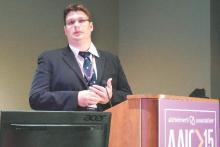WASHINGTON – Age-related cognitive declines have a different presentation in women and in men.
As men age they show a steeper decline, compared with women, in their ability to name words from a list, to name words that start with a specific letter, and in trail-making tests, according to initial, baseline results from 587 people enrolled in an online program designed to assess and intervene against age-related declines in cognitive function.
In contrast, age-related declines among women, compared with men, showed up more commonly for reading comprehension, three-dimensional rotation, and clock rotation tests, Thomas Beaudry said at the Alzheimer’s Association International Conference 2015. Scores on reaction time and on the Wisconsin Card Sorting Test declined with age at roughly similar rates regardless of sex.
These sex differences in rates of age-related cognitive declines in various mental function tests “suggest that careful thought needs to be put into the selection of tests used for diagnosis” of early-onset Alzheimer’s disease and other forms of age-related dementia, said Mr. Beaudry, a researcher at the McGill University Research Centre for Studies in Aging in Montreal.
Mr. Beaudry and his associates developed a website that allows registered participants to undergo assessments of their cognitive function at baseline. Participants are also encouraged to regularly play a variety of “brain games” online designed to improve or at least help maintain their cognitive function. Known as the Prevention of Neurodegenerative Diseases in Everyone at Risk (P.O.N.D.E.R.) program, it had enrolled 1,536 participants aged 16-97 years old as of July, Mr. Beaudry said. The enrollees averaged 57 years old, and 79% were women. About 60% of people who initially enrolled in the program have remained active participants, he said.
At the time of enrollment, participants complete a panel of eight cognitive function tests that cover memory, attention, executive function, orientation, constructive abilities, problem solving, language, and perceptual skills. In addition to completing these assessments at baseline, participants receive follow-up requests to undergo reassessment every 6 months. The baseline data that Mr. Beaudry and his associates analyzed and presented at the meeting came from the first 587 people who completed their enrollment assessments.
“What makes P.O.N.D.E.R. unique is the training approach” in which participants are asked to play brain games on the website, he said. The games are designed to challenge and develop the same cognitive skills addressed by the assessments. “The presymptomatic phase of Alzheimer’s disease presents a window for intervention through cognitive training to delay the onset and progression of the disease,” Mr. Beaudry said.


